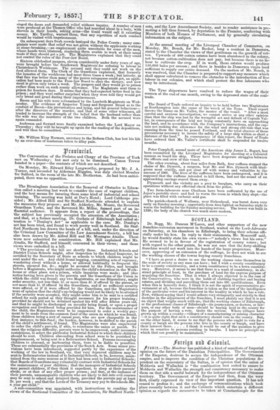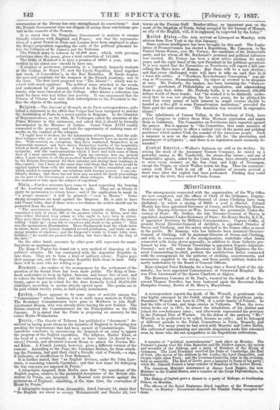furrign nut Zninuial.
purf.—The Monikur has published a kind of manifesto of Imperial opinion on the future of the Danubian Principalities. The Government of the Emperor, desirous to secure the independence of the Ottoman empire, and to improve the condition of the Christian populations dependent on the suzerainty of the Sultan, is of opinion that the union of Moldavia and Wallachia is "the combination best suited to assure to Moldavia and Wallachia the strength and consistency necessary to make them on that side a useful bulwark for the independence of the Ottoman territory. The Government of the Emperor had then, from the very first, clearly expressed its view of this important question, It has not ceased to profess it ; and the exchange of communications which took place recently between it and the Cabinets which entertain a different opinion as regards the measures to be taken at Constantinople for the
convocation of the Divans has only strengthened its convictions." And the French Government does not despair of seeing those convictions prevail in the councils of the Powers.
It is stated that the Neapolitan Government is anxious to resume friendly relations with England and France ; and that the representatives of a great Poweeat Paris and London have been employed to place the King's proposition regarding the exile of the political prisoners before the Cabinets of St. James's and the Tuileries.
The French army is reduced by 48,000 men ; which, with previous reductions since the peace, gives a total reduction of 141,000. The Duke of Malakoff is to have a pension of 40001. a year, with reversion to his eldest son—should he have one.
A number of gentlemen, amounting to a hundred, formerly students at the College de Henri IV, now the Lycee Napoleon, dined together last week, at Lemardelay's, in the Rue Richelieu, M. Emile Angier, the poet and candidate for the honours of the French Academy, was in the chair. The first toast proposed was "The Absent" ; which was received with much applause. The political sense attached to the words, and understood by all present, referred to the Princes of the Orleans family, who were educated at the College. After dinner a collection was made for those who had fallen into poverty. It was announced that the Princes of Orleans had sent their subscriptions to the President to further the objects of the meeting.
18a lgiath.—The Journal of Brussels, in its Paris correspondence, published a statement to the effect that Verger had been instigated to murder the Archbishop of Paris by a secret society in Belgium. In the Chamber of Representatives, on the 30th, M. Verhaegen called the attention of the Prime Minister to this statement, and asked that it should be formally investigated by the Minister of Justice. Count Vilain XIIII readily consented to the proposal, and took the opportunity of making some remarks on the conduct of the refugees.
"I ought here to declare, for the information of foreigners, that the political refugees who are at present residing in Brussels have no secret societies. With scarcely an exception, they have conducted themselves in an honourable manner, and have shown themselves worthy of the hospitality which is freely granted to them. I have for this proscribed class a sincere sympathy, and the communications which I have had with some of them were of a most agreeable character. Upon my entrance into my present office, I made known to all the proscribed that they would never be disturbed by the Belgian Government for their anterior acts during their residence in this country ; but I have at the same time told them that the laws would be applied against them with the utmost firmness if they committed any act which tended to compromise our relations with foreign powers. I can confidently declare, that there has not been any occasion for harsh proceedings on the part of the Government towards those refugees. We have had very few measures to take upon the subject of expulsion."
S ft I 4.—Further accounts have come to hand respecting the bearing of the Austrian amnesty on Italians in exile. They are at liberty to apply for permission to return home ; and if the application be made in "a proper manner," it will be granted—" even to Manin " Some strong accusations are made against the Emperor. He is said to have told Count Litta, that if there were a revolution the nobles should not be protected from the mob.
"The spontaneous illumination was thus brought about. The police organized a body of about 500 of the greatest villains in Milan, men who were either liberated from prison or who ought to have been in prison. They gave them drink and money; when they proceeded through the streets calling Light up ! ILong life to ourselves and death to the gentry !' This was the spontaneous illumination. These blackguards kept the whole town in alarm, broke into houses, wounded several gentlemen, and broke an immense number of windows ; and the Emperor's words to Count Litta were fulfilled= he would not protect the nobles, but leave them to the fury of the mob.'" On the other hand, accounts by other pens still represent the manifestations as spontaneous.
The King of Naples has found out a new method of disposing of his political enemies. He has contracted with the Argentine Republic to take them. They are to form a kind of military colony. Naples pays their passage out, and the Argentine Republic finds them in land. Only those will be sent who are willing to go.
BSIIIItaTit.—An outline of the arrangement for the settlement of the question of the Sound Dues has been made public. The King of Denmark undertakes to keep up lights, beacons, and buoys free of cost, and to reduce the land transit duty ; and the contracting states, parties to the treaty, agree to pay in return for the dues formerly levied 30,570,698 rixdollars, according to quotas already agreed upon. The quotas are to be paid within twenty years, in half-yearly instalments.
11/1414.—There appears to be some signs of activity among the " Commissions " whose business it is to settle many matters in Turkey The Boundary Commissioners have gone to Moldavia to join Staif Lieutenant Besson, who was already there tracing the new frontier. The Sultan received the Commissioners for the Principalities on the 25th January. It is stated that the Porte is preparing an amnesty for the exiled Moldo-Walleehians.
St Iitt —The Gazette of Teheran has published a "document" described as Lying great stress on the injustice of England in declaring war pending the negotiations that had been opened at Constantinople. This manifesto concludes by announcing the despatch of an army to oppose the progress of the English expedition. The Afghan, Haider Khan, at the head of a cavalry brigade, is said to have taken [it should be retaken) Finrah, and advanced towards Herat to attack the Persian Mured Mum. A French journal, however, gives a different version of the rumour. According to the Pays, the Candahar Birders, far from attacking the Persians had paid their chief a friendly visit at Furrah,—a sign, if authentic, of disaffection to Dost Mohamed. . It is further stated, that "an English division, under Sir John Lawranee, is marching towards Candahar ; and that new taxes for defraying the war expenses are imposed in Persia."
A telegraphic despatch from Berlin says that "the assertions of the English papers, relative to the pretended acceptance of the British ultimaim by Persia are incorrect. A Russian note protests against the pretensions of England; admitting, at the same time, the evacuation of gerat by Persia.'
A telegraphic despatch from Alexandria, dated January 24, states that "the English are about to occupy Mohammradd and Bender Ali, two towns on the Persian Gulf. Bender-Abbaz, an important post on the coast of the kingdom of Persia, being occupied by the Imam of Muscat, an ally of the English, will, it is supposed, be respected by the latter."
Ruin 0/SUL—The Asia arrived at Liverpool on Monday, with advices from New York to the 21st January.
Some curious intelligence has been brought by this mail. The Legislature of Pennsylvannia has elected a Republican, Mr. Cameron, to the United States Senate, over Mr. Forney, the candidate of the Democratic party, and for whom all Mr. Buchanan's personal and political inilueuce was exerted. Mr. Forney has been a most active partisan for many years, and the right hand of the new President in his political operations. It is now stated that the Committee on Territoriee will report a bill eauceiling the Slave laws of Kansas; that there will be a new election ; and that every challenged voter will have to take an oath that he is a bona fide settler. A 'Northern Revolutionary Convention" was sittang at Worcester, Massachusetts. Its object is avowed to be disunion at once. Mr. Peabody, the banker, has been lecturing the "drab-coloured" gentlemen of Philadelphia on repudiation, and admonishing them to pay their debts. Mr. Peabody holds it is understood 400,000 dollars worth of these bonds ; but "he wished it to be distinctly understood that he was not pleading for his own purse, for he pledged his word that every penny of back interest he might receive should be handed as a free gift to some Pennsylvanian institution," provided the
State paid the said arrears. The monition was received in expressive silence."
The inhabitants of Carson Valley, in the Territory of Utah, have prayed Congress to relieve them from Mormon oppression and annex them to California. The Committee on Territories have reported against the prayer. But it appears to "the Committee, that some measure of wider scope is necessary to effect a radical cure of the moral and political pestilence which makes Utah the scandal of the American people. Such a measure is now on the calendar—the bill for the prevention and punishment of polygamy ' ; and there is no legislation more earnestly demanded."
ellitt al ff.—Walker's fortunes are still in the decline. By
seizing the stock of the Accessory Transit Company, he raised up a powerful enemy in Mr. Vanderbilt, the steam-ship owner ; and one of Vanderbilt's agents, aided by the Costa Ricans, have cleverly contrived to seize every steamer on the San Juan and Lake of Nicaragua, except the Virgin, on which Walker hoists his flag. Thus his communication with New York is cut off. A number of recruits arrived a short time after the exploit had been performed. Finding they could not get up the river, they seized Punta Arenas.



































 Previous page
Previous page